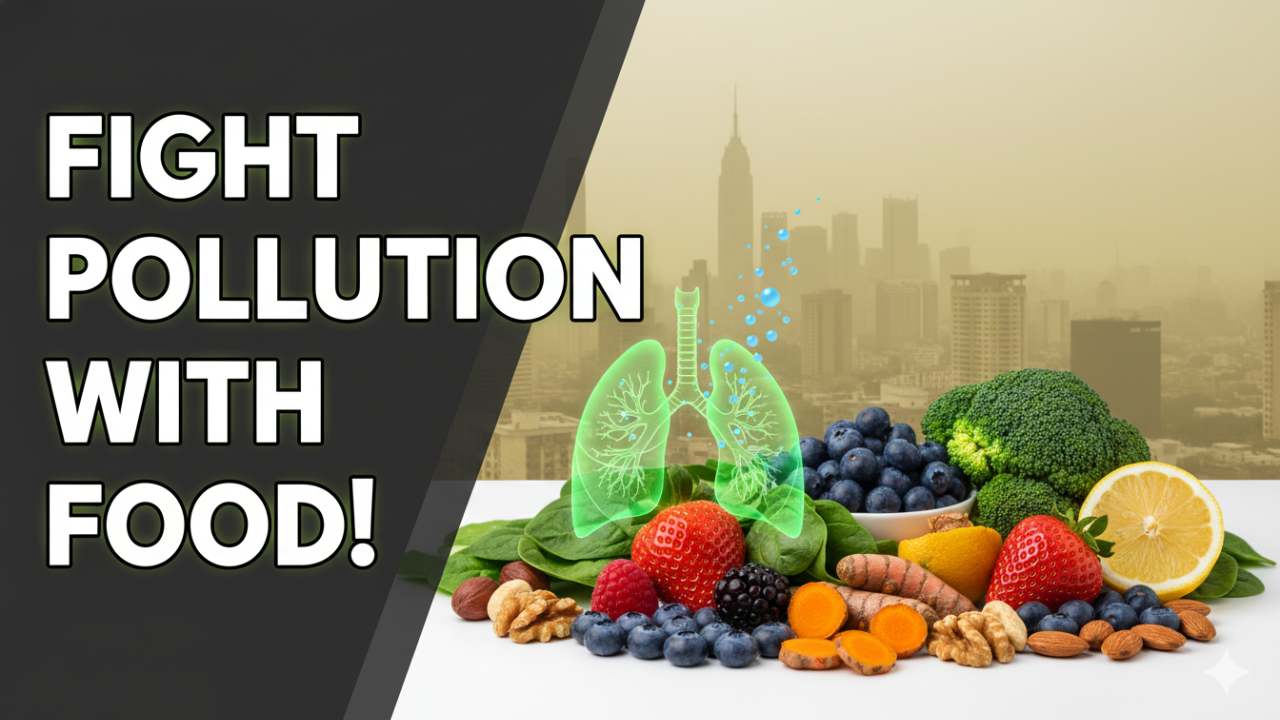Fighting Air Pollution with Smart Food Choices
Verified By Mrs. Durga Tak | 01-Nov-2025
As the air quality in urban regions continues to deteriorate, especially during the winter season, health concerns related to pollution are becoming increasingly significant. Prolonged exposure to polluted air can lead to respiratory issues, weakened immunity, fatigue, and various lifestyle-related disorders. While we cannot control external pollution levels completely, we can certainly strengthen our body’s defense mechanism through proper nutrition.
Mrs. Durga Tak, Dietitian, Kailash Hospital, Greater Noida, explains, “A well-balanced diet rich in antioxidants, vitamins, and minerals can help combat the ill effects of air pollution, support lung health, and improve immunity. What we eat plays a direct role in how our body responds to the environment around us.”
Table of Content
Among the nutrients that play a crucial role in detoxifying the body from pollutants, Vitamin C tops the list. It is a powerful antioxidant that not only protects cells from oxidative stress but also strengthens the immune system.
Mrs. Durga Tak shares, “Vitamin C acts like a natural shield for our body. It helps fight free radicals generated due to pollution and also boosts our natural defense system against infections.”
Some excellent sources of Vitamin C include oranges, lemons, amla (Indian gooseberry), and guava. Having a glass of lemon water with a pinch of salt twice a day can help maintain hydration, balance electrolytes, and flush out toxins.
Also read: Your "Healthy" Breakfast is a Lie. Here's What a Top Dietitian Says to Eat Instead
Another key nutrient in an anti-pollution diet is Vitamin E. Known for its strong antioxidant properties, Vitamin E protects the body’s cells from oxidative damage, improves immune function, and may help reduce inflammation caused by pollutants.
Good dietary sources of Vitamin E include almonds and other nuts, sunflower and flaxseeds, parsley, oregano, and other herbs. A handful of nuts and seeds daily can provide your body with this essential nutrient, says Mrs. Durga. “Vitamin E is especially important for people living in polluted cities. It helps protect lung tissues and keeps the respiratory system stronger.”
Pollution exposure often leads to inflammation in the respiratory tract and oxidative stress throughout the body. Replacing caffeinated beverages such as tea and coffee with herbal teas can make a big difference.
A warm cup of turmeric-ginger tea once or twice a day can not only comfort the throat but also enhance lung health and strengthen the immune response. Both turmeric and ginger have potent anti-inflammatory and detoxifying properties.
Mrs. Durga explains, “Turmeric reduces internal inflammation and helps the body detoxify, while ginger eases congestion and soothes the throat. During high-pollution days, starting your morning with a cup of turmeric-ginger tea can set the tone for a healthier day.”
Vegetables from the cruciferous family—such as cabbage, cauliflower, kale, and spinach—help the body eliminate toxins and support overall metabolic health. Including these vegetables regularly in soups, stir-fries, or steamed dishes can significantly improve your body’s ability to neutralize the harmful effects of pollutants.
Mrs. Durga Tak highlights, “Cruciferous vegetables work like natural cleansers, helping your body get rid of harmful toxins absorbed from polluted air.” She recommends adding green leafy vegetables like spinach and kale to daily meals, as they are rich in antioxidants that promote purification and oxygenation of the blood.
Also read: Boost Your Digestive Health: High-Fiber Foods for Constipation Relief
Raw tomatoes are an excellent source of lycopene, a naturally occurring antioxidant that protects cells against oxidative damage caused by free radicals. Regular consumption of raw or lightly cooked tomatoes can improve immunity, reduce inflammation, and protect lungs from pollution-related damage.
Mrs. Durga advises, “Lycopene in tomatoes is extremely beneficial for those exposed to pollution daily. Including raw tomatoes in salads or having fresh tomato juice supports lung health and boosts immunity naturally.”
Adding sliced tomatoes to salads or consuming them as fresh juice can be a simple yet powerful addition to your daily diet.
During high pollution periods, the digestive system often works harder to eliminate toxins. Consuming processed, deep-fried, and street foods adds unnecessary burden to the body and may increase inflammation. It’s important to eat home-cooked, hygienic, and nutrient-dense meals that provide energy and support the body’s natural detox mechanisms.
Mrs. Durga warns, “Pollution already increases oxidative stress in the body. When we consume junk or fried foods, we add to that stress.Sticking to home-cooked meals rich in vegetables, pulses, and whole grains can make a huge difference.”
She further emphasizes the importance of hydration: Drink enough water, coconut water, or fresh vegetable juices to help your body flush out toxins effectively.” Ensure your diet includes adequate protein sources such as pulses, legumes, paneer, and lentils, which help repair tissues and strengthen immunity.
While nutrition forms the foundation, lifestyle modifications are equally vital for complete protection. Regular yoga and breathing exercises can greatly improve lung capacity and oxygen utilization. Adequate sleep, stress management, and physical activity further enhance immunity and resilience against pollution-induced stress.
Mrs. Durga Tak, Dietitian at Kailash Hospital, Greater Noida, emphasizes: “Small daily changes—like choosing home-cooked meals, staying hydrated, and including herbal infusions—can go a long way in minimizing the impact of polluted air.”



 +91-9711918451
+91-9711918451
 international.marketing@kailashhealthcare.com
international.marketing@kailashhealthcare.com







